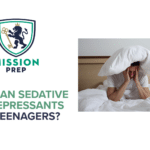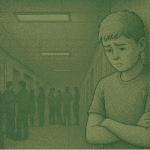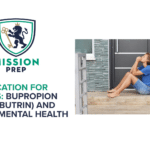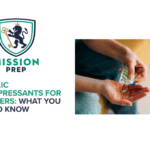Persistent Depressive Disorder: Symptoms, Causes, and Treatment
Persistent Depressive Disorder (PDD), also known as dysthymia or dysthymic disorder, is a chronic mood disorder that affects teens and adolescents by creating a consistently low mood for at least two years. Often referred to as chronic depression, PDD can make it difficult to manage daily life, affecting school performance, relationships, and overall well-being. At Mission Prep, we understand how overwhelming it can be to live with Persistent Depressive Disorder, but there is hope. Our compassionate and evidence-based treatment programs are specifically designed to help teens manage the symptoms of PDD and regain control of their lives. Through therapy, medication management, and support, we guide adolescents on the path to recovery. If you or someone you care about is struggling with chronic depression, don’t hesitate—reach out to us today to learn more about how our PDD treatment programs can make a difference.


Symptoms of Teen PDD
Persistent Depressive Disorder (PDD), also known as dysthymic depressive disorder, is a long-term mood disorder that can deeply affect a teen’s emotional well-being and daily functioning. While the symptoms may be less intense than major depression, they are persistent and can last for years, often impacting a teen’s ability to enjoy life and maintain healthy relationships. At Mission Prep, we understand the unique challenges teens face with PDD and work closely with them to identify and manage symptoms through compassionate, evidence-based care.
General Symptoms of Teen PDD
- Feelings of sadness or hopelessness
- Low self-esteem or excessive self-criticism
- Fatigue or low energy
- Difficulty concentrating or making decisions
- Irritability or anger
- Difficulty enjoying previously pleasurable activities
- Sleep disturbances (insomnia or oversleeping)
- Changes in appetite (either overeating or loss of appetite)
Symptoms by Demographics
Persistent Depressive Disorder (PDD) affects individuals differently depending on their age, and understanding these differences is key to providing effective treatment. At Mission Prep, we focus on helping teens manage their symptoms of dysthymia through personalized care. Persistent Depressive Disorder symptoms in teens often manifest as changes in behavior, academic performance, and social interactions. Recognizing these symptoms early is crucial in guiding them toward the right treatment plan. Below is a breakdown of how PDD can present in adults versus teens:
- Adults: Persistent low mood, fatigue, reduced productivity
- Teens: Irritability, academic struggles, social withdrawal
Recognizing these symptoms is the first step toward getting the right support. If you or your teen is showing signs of PDD, reach out to Mission Prep today to learn more about our specialized treatment options. We’re here to help every step of the way.
Causes of Adolescent PDD
The causes of PDD can be complex and multifaceted, often involving a combination of biological, genetic, and environmental factors. Understanding these underlying causes is essential to providing effective treatment and support for teens. At Mission Prep, we recognize that early intervention, especially in cases of early onset PDD, is crucial for long-term recovery. Below are some of the primary causes of Persistent Depressive Disorder:
Primary Causes of Teen PDD
Brain Chemistry
Imbalances in neurotransmitters affecting mood regulation.
Genetics
Family history of depression or mood disorders increases the likelihood of developing PDD.
Chronic Stress
Prolonged exposure to stress can trigger PDD.
Medical Conditions
Chronic illness and pain can lead to PDD.
Treatment for Teen PDD
Persistent Depressive Disorder (PDD) is a complex and long-term condition that typically requires a combination of treatments to effectively manage symptoms. At Mission Prep, our approach to Persistent Depressive Disorder treatment is tailored to each teen’s unique needs, combining medical, clinical, and holistic approaches to provide comprehensive care. Dysthymia treatment often involves a blend of medication, therapy, and lifestyle adjustments, all designed to help teens regain a sense of stability and well-being. Our goal is to empower individuals to take control of their mental health journey through personalized treatment plans that address both the physical and emotional aspects of PDD.

Medication for PDD
Medications are often a cornerstone in the treatment of Persistent Depressive Disorder and can be an essential part of managing chronic symptoms. Persistent Depressive Disorder medication is typically prescribed by mental health professionals, often Persistent Depressive Disorder specialists, who can accurately diagnose and monitor each teen’s progress. Medications such as antidepressants and mood stabilizers work to regulate brain chemistry and help alleviate the persistent low mood associated with dysthymia. While medication can provide significant relief, expert guidance is critical for finding the right balance.
Common PDD medications:
- Antidepressants: Selective serotonin reuptake inhibitors (SSRIs) and serotonin-norepinephrine reuptake inhibitors (SNRIs) are the most commonly prescribed medications.
- Mood Stabilizers: Sometimes prescribed for individuals with co-occurring mood disorders.
- Persistent Depressive Disorder specialists: Expert guidance is often required for accurate diagnosis and medication management.
Therapy for Adolescent PDD
Therapy plays an equally important role in treating Persistent Depressive Disorder by helping individuals identify and address the emotional and psychological factors contributing to their condition. At Mission Prep, we offer a range of evidence-based therapies to support teens on their path to recovery. PDD therapy focuses on building coping skills, improving thought patterns, and addressing interpersonal challenges. Whether it’s through Cognitive Behavioral Therapy (CBT), Interpersonal Therapy (IPT), or Mindfulness-Based Cognitive Therapy (MBCT), our therapeutic interventions are designed to promote long-term healing and resilience.
Common therapies for PDD:
- Cognitive Behavioral Therapy (CBT): Helps individuals challenge and change negative thinking patterns.
- Interpersonal Therapy (IPT): Focuses on improving personal relationships and coping strategies.
- Mindfulness-Based Cognitive Therapy (MBCT): Combines cognitive therapy and mindfulness techniques to prevent relapse.
At Mission Prep, we are dedicated to providing teens with the tools and support they need to overcome PDD and lead fulfilling lives. If you or someone you know is struggling with Persistent Depressive Disorder, contact us today to learn more about our specialized programs.
Integrated PDD Treatment Plans
At Mission Prep, we understand that integrated treatment for depression is often the most effective approach for teens dealing with Persistent Depressive Disorder (PDD). Research shows that a combination of medication and therapy yields the best results, addressing both the biological and emotional aspects of PDD. Our persistent depressive disorder treatments focus on creating a personalized care plan that integrates medical, therapeutic, and holistic interventions. Through careful care coordination, our multidisciplinary team—including psychiatrists, therapists, and wellness specialists—works together to provide teens with the comprehensive support they need to heal.
Common integrated treatment approaches for PDD include:
- Combination of Medication and Therapy: Studies show that combining medication and psychotherapy often provides the most effective results for individuals with PDD.
- Care Coordination: Multidisciplinary care teams work together to ensure comprehensive and holistic treatment.
Mission Prep is committed to providing teens with a balanced, supportive environment that fosters long-term mental health and well-being. Reach out to us today to learn more about how we can help.

Our PDD Treatment Program
At Mission Prep, our PDD treatment program is specifically designed to meet the unique needs of each teen, providing a tailored approach to treating chronic depression. Our holistic and evidence-based methods ensure that every individual receives personalized care that addresses both the mental and emotional aspects of how to treat Persistent Depressive Disorder. Our program combines medication management, individual and group therapy, and wellness activities to promote lasting recovery and emotional resilience. With a focus on compassionate, teen-centered care, we help individuals rediscover their strengths and build a foundation for a brighter future.
Benefits of our PDD treatment program include:
- Individualized Treatment Plans: Tailored to each teen’s specific needs for optimal results.
- Comprehensive Care: Medication, therapy, and holistic support for complete emotional well-being.
- Experienced Team: Specialized professionals focused on adolescent mental health and recovery.
If you or someone you know is struggling with chronic depression, contact us today to learn more about how our PDD treatment program can help. We’re here to support you every step of the way.
Inpatient vs. Outpatient PDD Care
At Mission Prep, we offer both inpatient depression treatment and outpatient PDD treatment options to meet the diverse needs of teens struggling with Persistent Depressive Disorder. For individuals experiencing severe or long-term symptoms, our inpatient program provides intensive, 24/7 support in a safe and structured residential setting, helping teens focus fully on their recovery. For those who can manage daily responsibilities but still need ongoing therapy and support, our outpatient program offers a more flexible approach, allowing teens to receive regular treatment while continuing with school and daily life.
Our treatment options include:
- Inpatient Depression Treatment: Intensive care with 24/7 support in a residential setting, ideal for severe or long-term cases.
- Outpatient PDD Treatment: Flexible therapy options for teens who can manage daily life but still need regular professional support.
If you or your teen could benefit from either program, reach out to us today to learn more about how we can help. Our team is dedicated to providing the highest level of care for lasting recovery.



















